Ford Kuga VS Hyundai IONIQ 6 – Specs, Efficiency & Price Comparison
Which model is the better choice – the Ford Kuga or the Hyundai IONIQ 6? We compare performance (243 HP vs 325 HP), boot capacity (412 L vs 401 L), efficiency (0.90 L vs 13.90 kWh), and of course, the price (34200 £ vs 37600 £).
Find out now which car fits your needs better!
The Ford Kuga (SUV) is powered by a Petrol, Full Hybrid or Plugin Hybrid engine and comes with a Manuel or Automatic transmission. In comparison, the Hyundai IONIQ 6 (Hatchback) features a Electric engine and a Automatic gearbox.
When it comes to boot capacity, the Ford Kuga offers 412 L, while the Hyundai IONIQ 6 provides 401 L – depending on what matters most to you. If you’re looking for more power, you’ll need to decide whether the 243 HP of the Ford Kuga or the 325 HP of the Hyundai IONIQ 6 suits your needs better.
There are also differences in efficiency: 0.90 L vs 13.90 kWh. In terms of price, the Ford Kuga starts at 34200 £, while the Hyundai IONIQ 6 is available from 37600 £.
Compare all the key specs now and find out which model fits your lifestyle best!
Ford Kuga
The Ford Kuga stands out in the realm of compact SUVs with its sleek design and dynamic performance capabilities. Its spacious interior is thoughtfully designed to provide comfort and practicality for both driver and passengers, making it an ideal choice for families and adventurers alike. Advanced technology and safety features further enhance the driving experience, ensuring a seamless blend of innovation and reliability on the road.
details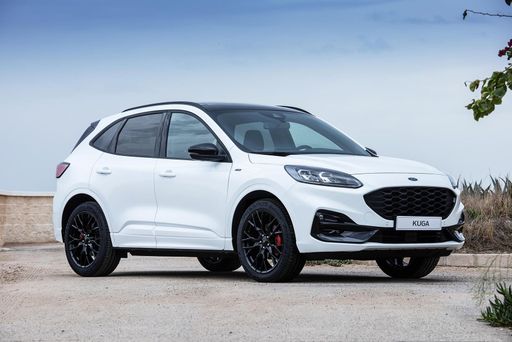 @ kuga.fordpresskits.com
@ kuga.fordpresskits.com
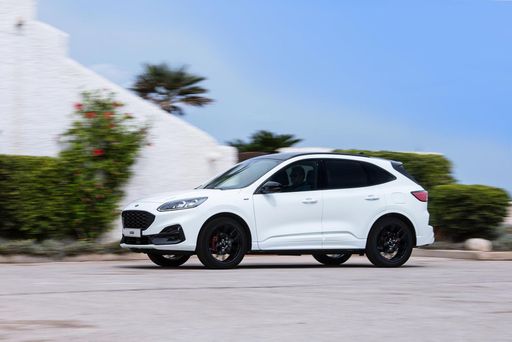 @ kuga.fordpresskits.com
@ kuga.fordpresskits.com
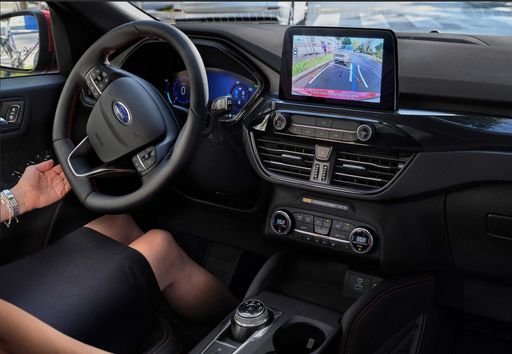 @ kuga.fordpresskits.com
@ kuga.fordpresskits.com
Hyundai IONIQ 6
The Hyundai IONIQ 6 merges futuristic design with eco-friendly technology, offering a glimpse into the future of electric mobility. Its sleek silhouette and aerodynamic profile are sure to capture attention on the road, while the interior provides a seamless blend of comfort and cutting-edge digital features. With a focus on efficiency and sustainability, this model represents a significant step forward in the evolution of electric vehicles.
details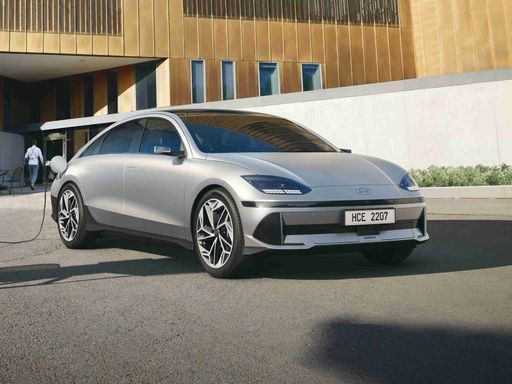 @ hyundai.news
@ hyundai.news
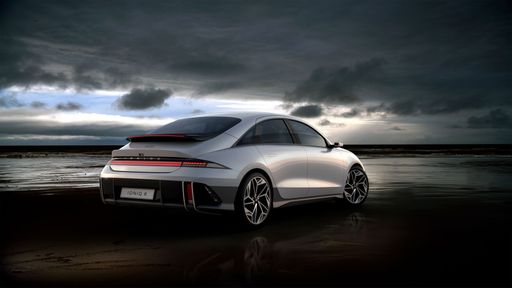 @ hyundai.news
@ hyundai.news
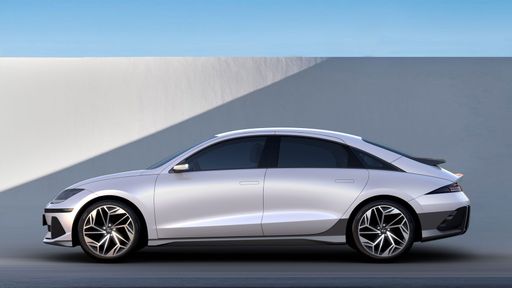 @ hyundai.news
@ hyundai.news
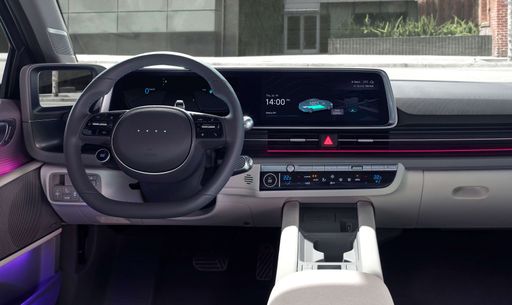 @ hyundai.news
@ hyundai.news

|

|
|
|
|
Costs and Consumption |
|
|---|---|
|
Price
34200 - 45000 £
|
Price
37600 - 55000 £
|
|
Consumption L/100km
0.9 - 6.4 L
|
Consumption L/100km
-
|
|
Consumption kWh/100km
-
|
Consumption kWh/100km
13.9 - 15.1 kWh
|
|
Electric Range
69 km
|
Electric Range
429 - 614 km
|
|
Battery Capacity
1.1 - 14.4 kWh
|
Battery Capacity
53 - 77.4 kWh
|
|
co2
20 - 145 g/km
|
co2
0 g/km
|
|
Fuel tank capacity
42 - 54 L
|
Fuel tank capacity
-
|
Dimensions and Body |
|
|---|---|
|
Body Type
SUV
|
Body Type
Hatchback
|
|
Seats
5
|
Seats
5
|
|
Doors
5
|
Doors
4
|
|
Curb weight
1526 - 1859 kg
|
Curb weight
1850 - 2095 kg
|
|
Trunk capacity
412 L
|
Trunk capacity
401 L
|
|
Length
4604 - 4645 mm
|
Length
4855 mm
|
|
Width
1882 mm
|
Width
1880 mm
|
|
Height
1673 - 1681 mm
|
Height
1495 mm
|
|
Payload
541 - 550 kg
|
Payload
425 - 430 kg
|
Engine and Performance |
|
|---|---|
|
Engine Type
Petrol, Full Hybrid, Plugin Hybrid
|
Engine Type
Electric
|
|
Transmission
Manuel, Automatic
|
Transmission
Automatic
|
|
Transmission Detail
Manual Gearbox, CVT
|
Transmission Detail
Reduction Gearbox
|
|
Drive Type
Front-Wheel Drive, All-Wheel Drive
|
Drive Type
Rear-Wheel Drive, All-Wheel Drive
|
|
Power HP
150 - 243 HP
|
Power HP
151 - 325 HP
|
|
Acceleration 0-100km/h
7.3 - 9.5 s
|
Acceleration 0-100km/h
5.1 - 8.8 s
|
|
Max Speed
195 - 200 km/h
|
Max Speed
185 km/h
|
|
Torque
240 Nm
|
Torque
350 - 605 Nm
|
|
Number of Cylinders
3 - 4
|
Number of Cylinders
-
|
|
Power kW
110 - 178 kW
|
Power kW
111 - 239 kW
|
|
Engine capacity
1497 - 2488 cm3
|
Engine capacity
-
|
General |
|
|---|---|
|
Model Year
2024
|
Model Year
2022
|
|
CO2 Efficiency Class
E, D, B
|
CO2 Efficiency Class
A
|
|
Brand
Ford
|
Brand
Hyundai
|
Ford Kuga
Discovering the Ford Kuga: An SUV for the Modern Age
The Ford Kuga has established itself as a versatile and reliable choice in the competitive SUV market. Combining sleek design with innovative technology, the Kuga offers a range of options to suit different driving preferences and needs. Let’s delve into the various technical details and pioneering features that make this vehicle stand out.
Design and Construction
The Ford Kuga embodies a contemporary design ethos, with dimensions that accommodate both functionality and style. Measuring between 4604 and 4645 mm in length, the Kuga is designed to offer ample interior space while maintaining a compact exterior profile. This is complemented by a width of 1882 to 1883 mm and a height ranging from 1650 to 1681 mm, ensuring a comfortable and commanding drive on the road.
Innovative Powertrains
With a diverse array of engine configurations, the Kuga caters to both traditional and eco-conscious drivers. The range includes 1.5-litre EcoBoost petrol engines, 2.0-litre EcoBlue diesel options, as well as an innovative 2.5-litre full hybrid and plug-in hybrid variants. The hybrid models, particularly the plug-in hybrid, offer impressive efficiency with a consumption as low as 0.9 L/100 km and an electric range of up to 69 km.
Performance and Efficiency
The Kuga delivers a robust performance with power outputs ranging from 120 PS to 243 PS, ensuring there is a model to match your driving style. The vehicle accelerates from 0-100 km/h in as little as 7.3 seconds, depending on the chosen powertrain. Notably, the plug-in hybrid versions allow for considerable fuel savings, making the Kuga a cost-effective option for long-term use.
Advanced Technology and Features
Ford has integrated the latest technology into the Kuga, enhancing both comfort and safety. The vehicle features multiple driving modes tailored to different terrains, advanced driver-assistance systems, and a user-friendly infotainment system that keeps all controls within easy reach. The intelligent all-wheel-drive system available on certain models provides enhanced grip and stability in challenging conditions.
Interior Comfort and Practicality
Inside the Kuga, you'll find a spacious cabin with seating for five, designed with both comfort and utility in mind. The boot space ranges from 405 to 435 litres, allowing for an impressive amount of luggage capacity. High-quality materials and smart design choices throughout the cabin ensure a premium experience, further enhanced by options like Vignale trims for those seeking added luxury.
A Sustainable Choice
With its focus on efficiency and reduced emissions, the Ford Kuga aligns with the growing demand for environmentally responsible vehicles. The CO2 emissions range from 20 to 155 g/km, placing many models in favourable efficiency classes, thus contributing to a more sustainable future.
Conclusion
The Ford Kuga stands out in the SUV segment by offering a perfect blend of performance, technology, and sustainability. Its versatility makes it an ideal choice for diverse lifestyles, from urban adventures to rural explorations. With its innovative features and design, the Kuga is a testament to Ford’s commitment to delivering high-quality vehicles suited to today's discerning drivers.
Hyundai IONIQ 6
Introducing the Hyundai IONIQ 6: A New Era of Electric Mobility
The Hyundai IONIQ 6 is more than just a car; it's a glimpse into the future of electric mobility. With cutting-edge technology, impressive performance, and a sustainable design, this vehicle stands as a beacon for the automotive industry's electric revolution. Let's delve into what makes the IONIQ 6 a standout choice in the rapidly growing electric vehicle market.
Performance and Power: The Heart of the IONIQ 6
The Hyundai IONIQ 6 offers two battery options – a 53 kWh version and a more powerful 77.4 kWh variant. Depending on the configuration, drivers can experience a power output ranging from 151 PS to a remarkable 325 PS, highlighting the versatility of this model. With a maximum torque of up to 605 Nm, acceleration from 0-100 km/h is achieved in just 5.1 to 8.8 seconds, catering to both efficiency enthusiasts and those with a penchant for speed.
Efficiency and Range: Long Journeys Made Easy
One of the IONIQ 6's standout features is its exceptional range. Offering an electric range between 429 km to an impressive 614 km on a single charge, it's designed to go the distance. Efficiency is at the forefront, with energy consumption between 13.9 kWh/100km and 15.1 kWh/100km, ensuring that your driving experience remains as eco-friendly as it is enjoyable. All variants boast a CO2 efficiency class of A, reflecting Hyundai's commitment to sustainability.
Design and Interior: Luxury Meets Sustainability
The IONIQ 6's sleek, aerodynamic design is not only visually stunning but also functional, reducing air resistance to maximise efficiency. Offering a hatchback style, it comfortably seats five, ensuring ample space for passengers and luggage. The interior is crafted with sustainable materials, combining advanced technology with an eco-conscious ethos. With a boot capacity of 401 litres, it seamlessly balances practicality with style.
Technology and Innovation: Driving into the Future
Packed with the latest automotive technologies, the IONIQ 6 integrates the future of driving with present-day conveniences. It features a state-of-the-art automatic transmission with a reduction gearbox that ensures smooth driving dynamics. Its advanced driver assistance and safety systems provide peace of mind on every journey, making it an ideal choice for progressive drivers who embrace technology.
Conclusion: A Competitively Priced Electric Option
The Hyundai IONIQ 6 offers an enticing blend of performance, range, and sustainability. With prices ranging from €43,900 to €64,200, it represents excellent value for an electric vehicle of its calibre. Monthly costs are competitively set between €1066 to €1379, while cost per km ranges between 42.7 to 55.2 cents, appealing to cost-conscious customers without compromising on quality or innovation. The IONIQ 6 is a triumph of modern engineering, making it a strong contender in the electric vehicle market.
The prices and data displayed are estimates based on German list prices and may vary by country. This information is not legally binding.
